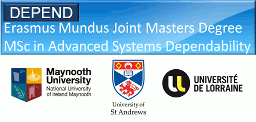MOBILITY PATHS
This is a 2-year course. Students attend two of the three universities, for one year at each. The 1-week DEPEND summer school is held at a different university every year, so students may also get a chance to visit the third university during the course.
THEMES
The programme consists of 6 themes, delivered across the three universities:
- Formal Methods for Dependability (FSD)
- Rigorous Software Development (RSD)
- Software Engineering (SE)
- Artificial Intelligence (AI)
- Data Science (DS)
- Research and Experiential Learning (REL)
OUTCOMES
The outcomes for each theme are as follows.
- Theme 1: Rigorous Software Development (RSD).Learning outcomes: on completion of this theme, students will have gained skills and experience in the application of rigorous software development techniques to the production of highly dependable software systems. Students will be prepared to apply their learning to analyse, design, model, implement, and test software, applying domain-specific technologies in internet/web-based systems, databases, and cryptography, and based on an understanding of the fundamental principles of computation and object-orientation, in the research and development of highly dependable software systems.
- Theme 2: Software Engineering (SE). Learning outcomes: on completion of this theme, students will have gained skills and experience in the application of general software engineering principles and practice, software architecture, and critical systems engineering. Students will be prepared to apply their learning in the research and development of highly dependable software systems.
- Theme 3: Artificial Intelligence (AI). Learning outcomes: on completion of this theme, students will have gained skills and experience in the application of this key, state-of-the-art topic in the field of dependable software. Students will be prepared to apply their learning into artificial intelligence in the research and development of software systems that use AI to achieve high levels of dependability in poorly specified or highly changeable environments.
- Theme 4: Data Science (DS). Learning outcomes: on completion of this theme, students will have gained skills and experience in data-intensive systems, data mining, and knowledge discovery as applied to dependable software systems. Students will be prepared to apply their learning in the research and development of highly dependable, data-intensive software systems.
- Theme 5: Formal methods for dependability (FSD). Learning outcomes: on completion of this theme, students will have gained skills and experience in the key, state-of-the-art fields of the application of formal methods to the analysis, design, development, and proof of software-based systems, with additional knowledge of the application of formal methods to data engineering, protocols, and cryptography along with supplementary skills in professional development.
- Theme 6: Research and Experiential Learning (REL). Learning outcomes: on completion of this theme, students will have gained skills and experience in planning and executing research projects, and in working in and industrial or professional research environment. Students will be prepared to apply their learning in a work environment: be it in academic research, in industrial research, or an industrial development environment, producing advances in dependability of products with a high degree of dependability.
MODULE DETAILS
- The themes delivered by each university, and the modules in each theme.
- Module Learning Outcomes.
- Final module selection is conditional on agreement with the course-coordinator at each institution.
- Further information can be found here.
COURSE CO-ORDINATORS
- Maynooth University: Dr. Joseph Timoney
- St. Andrews University: Dr. Juliana Bowles
- Universite de Lorraine: Dr. Didier Galmiche

